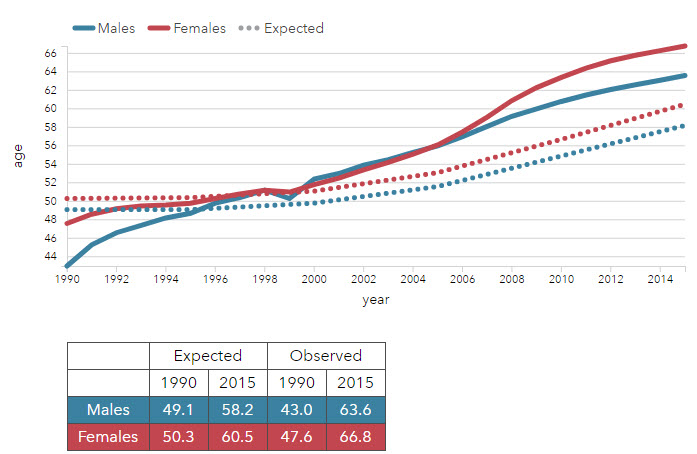In Ethiopia the Global Burden of Disease (GBD) study is being used to support the Ministry of Health’s drive to strengthen evidence-based decision-making, in collaboration with key partners.
Ethiopia has invested significantly in its health system over the past two decades and has made great strides in improving health outcomes and increasing access to services as a result. Life expectancy for both sexes rose from 52 years in 2000 to 65 years in 2015 – which is higher than researchers expected based on Ethiopia’s level of development –while maternal and child mortality, along with premature death and disability caused by HIV/AIDS, malaria, and tuberculosis, have all seen considerable declines over the same period. However, Ethiopia continues to face a high burden of poor health from infectious diseases and maternal and childhood disorders, compounded by the growing impact of non-communicable conditions like cardiovascular disease, cancer, and mental illness.
Life expectancy, Ethiopia, 1990–2015, expected versus observed

To build on Ethiopia’s progress and tackle these challenges, the Federal Ministry of Health and the Ethiopian Public Health Institute (EPHI) are making a renewed commitment to supporting the generation and uptake of timely, rigorous evidence for decision-making in the health sector. Good data are essential for helping policymakers set priorities, allocate resources, and measure progress, but it can be difficult to ensure that the right evidence is there when it’s needed, and that researchers and policymakers are on the same page about what results mean and how they can be used. Recognizing this, they are implementing strategies aimed at overcoming these obstacles: improving surveillance systems, building capacity for data processing and analysis, making sure that research timelines are better aligned to policy cycles, and strengthening institutional mechanisms for knowledge transfer between government officials and researchers.
The Global Burden of Disease (GBD) study is a key part of this effort. Under the leadership of the Ministry of Health, IHME is working with EPHI to establish a Burden of Disease Unit and National Data Management Center in Ethiopia, tasked with collating and analyzing data from every available source in the country in order to provide comprehensive, timely, and actionable evidence on the nation’s health. This joint effort will also focus on building the systems and skills needed to produce burden of disease estimates on an ongoing basis.
Speaking last year at EPHI’s 3rd Scientific Congress, then Minister for Health Dr. Kesetebirhan Admasu said, “The most important component is generating evidence, evidence, evidence [and] to make sure that research is translated into policies, programs, and actions…you really have to understand the priorities of the health sector, and understand the burden of disease. That is why I am setting up, in collaboration with IHME, a Global Burden of Disease Unit within EPHI.”
This effort builds on a longer history of engagement with IHME, as collaborators from the Ministry, EPHI, universities, and other institutions in Ethiopia have played an important role in the formulation and dissemination of GBD estimates. This has already led to the use of IHME’s data in high-level decision-making; most notably, GBD data helped to guide the development of Ethiopia’s latest five-year Health Sector Transformation Plan, a key strategic document outlining the country’s health-related priorities and objectives.
The new Burden of Disease Unit, along with the Data Management Center, will help to provide data that support national-level strategies and guidelines like this, but will also generate subnational estimates to highlight regional trends in health issues and outcomes. This level of detail will allow for even more finely-tuned action and interventions. As Dr. Kesetebirhan went on to explain, “Ethiopia is a huge country, it is diverse, and you can expect a varying degree of disease and for the burden to differ from one region to another. So we really need to have these kinds of studies and research outputs to guide our sector planning processes.” By investing in the production and uptake of fine-grained burden of disease estimates, the government of Ethiopia is furthering its commitment to the goal of equity and access to health care for all.